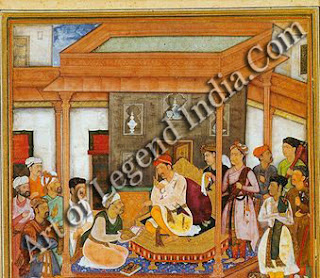 The Babur
Nama reflects the character and interests of the author, Zehir-ed-Din Muhammad Babur. Babur, the founder of the Mughal dynasty in India, is regarded as one of
the most romantic and interesting personalities of Asian history. He was a man
of indomitable will, a great soldier, and an inspiring leader. But unlike most
men of action he was also a man of letters with fine literary taste and
fastidious critical perception. In Persian, he was an accomplished poet, and in
his mother-tongue, the Turki, he was master of a simple forceful style.
The Babur
Nama reflects the character and interests of the author, Zehir-ed-Din Muhammad Babur. Babur, the founder of the Mughal dynasty in India, is regarded as one of
the most romantic and interesting personalities of Asian history. He was a man
of indomitable will, a great soldier, and an inspiring leader. But unlike most
men of action he was also a man of letters with fine literary taste and
fastidious critical perception. In Persian, he was an accomplished poet, and in
his mother-tongue, the Turki, he was master of a simple forceful style.  At
times Babur was so engrossed in this work that he forgot his surroundings
completely. According to his daughter, Gulbadan, once when he was busy on his
autobiography a storm blew up and the tent in which he was dictating came down
on his head with the result that "sections and book were drenched under
water and gathered together with much difficulty." But he attached such a
great importance to rescuing the papers that he with the help of his daughter
"laid them in the folds of a woolen throne carpet, put this on the throne,
and on it piled blankets and then kindled a fire inspite of the wet" and
occupied himself "till shot of day drying folios and sections."
At
times Babur was so engrossed in this work that he forgot his surroundings
completely. According to his daughter, Gulbadan, once when he was busy on his
autobiography a storm blew up and the tent in which he was dictating came down
on his head with the result that "sections and book were drenched under
water and gathered together with much difficulty." But he attached such a
great importance to rescuing the papers that he with the help of his daughter
"laid them in the folds of a woolen throne carpet, put this on the throne,
and on it piled blankets and then kindled a fire inspite of the wet" and
occupied himself "till shot of day drying folios and sections." Humayun carried Babur's original
manuscript with him to exile from 1551 to 1555 and used his leisure moments to
annotate it. Akbar showed his veneration for the book by ordering, Khan-i-Khana
Abdur Rahim to translate it into Persian. Abdur Rahim is recorded to have
finished the assignment in 1589 when he presented to Akbar, its Persian version
under the title Waquit-i-Baburi. Jahangir retouched a copy of the Babur Nama
which he tried to annotate and complete by supplying the missing links. ShahJahan adored the book. Among the select books that he would daily hear being
recited to him before going to sleep was the Babur Nama. Aurangzeb got
inscribed a number of Babur Nam& from the original preserved in the Royal
Library and sent them to many places of importance in his rapidly expanding
empire.
Humayun carried Babur's original
manuscript with him to exile from 1551 to 1555 and used his leisure moments to
annotate it. Akbar showed his veneration for the book by ordering, Khan-i-Khana
Abdur Rahim to translate it into Persian. Abdur Rahim is recorded to have
finished the assignment in 1589 when he presented to Akbar, its Persian version
under the title Waquit-i-Baburi. Jahangir retouched a copy of the Babur Nama
which he tried to annotate and complete by supplying the missing links. ShahJahan adored the book. Among the select books that he would daily hear being
recited to him before going to sleep was the Babur Nama. Aurangzeb got
inscribed a number of Babur Nam& from the original preserved in the Royal
Library and sent them to many places of importance in his rapidly expanding
empire. 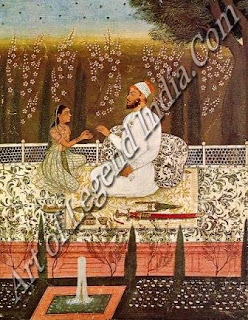 In
the early years of the nineteenth century when the British interest in the
Mughals and their history was acquiring depth, a translation of the Waquit-i-Baburi,
was started by Dr Leyden. He seems to have liked the work and did lot of
jottings from Waquit-i-Baburi when Elphinstone arrived at Calcutta and sent him
the Babur Nama which he had purchased at Peshawar in 1810. The Babur Nãmã in
Turkish slackened Leyden's enthusiasm for the work that he had been doing and
he left the translation of Waquit-i-Baburi only partially done before his death
in 1811. What Leyden had left half done was completed by Erskine. Perhaps
without knowing that Leyden was engaged in the translation of Waquit-i-Baburi,
Erskine had also been busy translating it but just as he was thinking of giving
final touches to his translation, he received all the jottings and papers of
Leyden passed on to him after the latter's death in Java in 1811. The arrival
of Leyden papers forced Erskine to revise the work that he had al-ready done
and it kept him busy for another five years. It was only in 1816 now that he
passed on the twice done translation to England to be published in the joint
name of Leyden and him-self under the title Memoirs of Babur. A little time
before he had done that like Leyden five years earlier, he too received the Babur
Nama from Elphinstone but, possibly because he was not well-versed in Turki or
felt too tired to begin the translation, already done twice by him, for the
third time, made no use of the Turki manuscript. The Memoirs of Babur in Leyden
and Erskine's name finally published in 1826 were consequently rightly looked
upon by the indologists all over Europe as a translation of a translation of
Babur's memoirs.
In
the early years of the nineteenth century when the British interest in the
Mughals and their history was acquiring depth, a translation of the Waquit-i-Baburi,
was started by Dr Leyden. He seems to have liked the work and did lot of
jottings from Waquit-i-Baburi when Elphinstone arrived at Calcutta and sent him
the Babur Nama which he had purchased at Peshawar in 1810. The Babur Nãmã in
Turkish slackened Leyden's enthusiasm for the work that he had been doing and
he left the translation of Waquit-i-Baburi only partially done before his death
in 1811. What Leyden had left half done was completed by Erskine. Perhaps
without knowing that Leyden was engaged in the translation of Waquit-i-Baburi,
Erskine had also been busy translating it but just as he was thinking of giving
final touches to his translation, he received all the jottings and papers of
Leyden passed on to him after the latter's death in Java in 1811. The arrival
of Leyden papers forced Erskine to revise the work that he had al-ready done
and it kept him busy for another five years. It was only in 1816 now that he
passed on the twice done translation to England to be published in the joint
name of Leyden and him-self under the title Memoirs of Babur. A little time
before he had done that like Leyden five years earlier, he too received the Babur
Nama from Elphinstone but, possibly because he was not well-versed in Turki or
felt too tired to begin the translation, already done twice by him, for the
third time, made no use of the Turki manuscript. The Memoirs of Babur in Leyden
and Erskine's name finally published in 1826 were consequently rightly looked
upon by the indologists all over Europe as a translation of a translation of
Babur's memoirs. 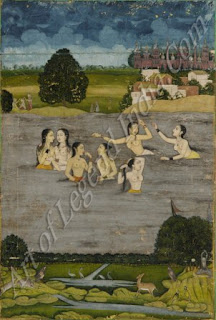 The
Memoirs of Babur was looked upon as a valuable contribution to understanding
Babur. Its extracts were translated and published in German by A. Kaiser in
1828 as Denkwurd-ingkeiton des Zahir-uddin Muhammad Babur. In 1844, R. M.
Galdeff not only based his The Life of Babur on Leyden and Erskine's Memoirs of
Babur but further showed the importance in which he held the latter work by
publishing An Abridgement of the Memoirs, a work which was a summary of Leyden
and Erskine's work published eighteen years earlier.
The
Memoirs of Babur was looked upon as a valuable contribution to understanding
Babur. Its extracts were translated and published in German by A. Kaiser in
1828 as Denkwurd-ingkeiton des Zahir-uddin Muhammad Babur. In 1844, R. M.
Galdeff not only based his The Life of Babur on Leyden and Erskine's Memoirs of
Babur but further showed the importance in which he held the latter work by
publishing An Abridgement of the Memoirs, a work which was a summary of Leyden
and Erskine's work published eighteen years earlier. 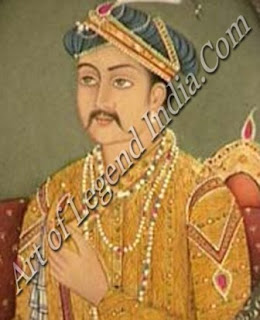 It
was left to Mrs. A. S. Beveridge to do the translation into English from a
genuine copy Turki Babur Nama. What made it possible for her to do that was
firstly the discovery of a genuine Turki copy of the Babur Nama in Hyderabad
and secondly her success in not only procuring it for herself for some time but
also have a number of fascimiles made of it by the E. J. Wilkinson Gibb Trust.
These fascimiles enabled Mrs. Beveridge to prove to scholars that the Hyderabad
Babur Nama surpassed both in volume and quality, all other Babur Nama. She
wrote a series of articles in the Journal of Royal Asiatic Society between 1900
and 1908 and finally came out with its English translation in 1926. It is this
translation which I have utilized in explaining the contents of paintings.
It
was left to Mrs. A. S. Beveridge to do the translation into English from a
genuine copy Turki Babur Nama. What made it possible for her to do that was
firstly the discovery of a genuine Turki copy of the Babur Nama in Hyderabad
and secondly her success in not only procuring it for herself for some time but
also have a number of fascimiles made of it by the E. J. Wilkinson Gibb Trust.
These fascimiles enabled Mrs. Beveridge to prove to scholars that the Hyderabad
Babur Nama surpassed both in volume and quality, all other Babur Nama. She
wrote a series of articles in the Journal of Royal Asiatic Society between 1900
and 1908 and finally came out with its English translation in 1926. It is this
translation which I have utilized in explaining the contents of paintings. 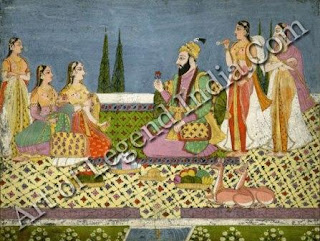 As a picture of the life of an Eastern
sovereign in court and camp, the book stands unrivalled among Oriental
autobiographies. "It is almost the only specimen of real history in
Asia... In Babur Nama the figures, dresses, habits, and tastes, of each
individual introduced are described with such minuteness and reality that we
seem to live among them, and to know their persons as well as we do their
characters. His descriptions of the countries visited, their scenery, climate,
productions, and works of art are more full and accurate than will, perhaps, be
found in equal space in any modern traveller."
As a picture of the life of an Eastern
sovereign in court and camp, the book stands unrivalled among Oriental
autobiographies. "It is almost the only specimen of real history in
Asia... In Babur Nama the figures, dresses, habits, and tastes, of each
individual introduced are described with such minuteness and reality that we
seem to live among them, and to know their persons as well as we do their
characters. His descriptions of the countries visited, their scenery, climate,
productions, and works of art are more full and accurate than will, perhaps, be
found in equal space in any modern traveller."  It is
in truthful narration of events of his personal life that the value of the
Babur Nama lies. Like most adolescents Babur also passed through a homosexual
phase. He thus describes his love for a boy. "At this time there happened
to be a lad belonging to the camp-bazaar, named Baburi. There was an odd sort
of coincidence in our names. Sometimes it happened that Baburi came to visit
me; when, from shame and modesty, I found myself unable to look him direct in
the face. How then is it to be supposed that I could amuse him with
conversation or a disclosure of my passion? From intoxication and confusion of
mind I was unable to thank him for his visit; it is not therefore to be
imagined that I had power to reproach him with his departure. I had not even
self-command enough to receive him with the common forms of politeness. One day
while this affection and attachment lasted, I was by chance passing through a
narrow lane with only a few attendants, when, of a sudden, I met Baburi face to
face. Such was the impression produced on me by this encounter that I almost
fell to pieces. I had not the power to meet his eyes, or to articulate a single
word. With great confusion and shame I passed on and left him, remembering the
verses of Muhammad Salih:
It is
in truthful narration of events of his personal life that the value of the
Babur Nama lies. Like most adolescents Babur also passed through a homosexual
phase. He thus describes his love for a boy. "At this time there happened
to be a lad belonging to the camp-bazaar, named Baburi. There was an odd sort
of coincidence in our names. Sometimes it happened that Baburi came to visit
me; when, from shame and modesty, I found myself unable to look him direct in
the face. How then is it to be supposed that I could amuse him with
conversation or a disclosure of my passion? From intoxication and confusion of
mind I was unable to thank him for his visit; it is not therefore to be
imagined that I had power to reproach him with his departure. I had not even
self-command enough to receive him with the common forms of politeness. One day
while this affection and attachment lasted, I was by chance passing through a
narrow lane with only a few attendants, when, of a sudden, I met Baburi face to
face. Such was the impression produced on me by this encounter that I almost
fell to pieces. I had not the power to meet his eyes, or to articulate a single
word. With great confusion and shame I passed on and left him, remembering the
verses of Muhammad Salih: "I am abashed whenever T see my love;
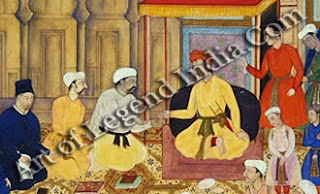 "The
verses were wonderfully suited to my situation. From the violence of my passion
and the effervescence of youth and madness, I used to stroll bare-headed and
barefoot through lane and street, garden and orchard, neglecting the attentions
due to friend and stranger; and the respect due to myself and others."
"The
verses were wonderfully suited to my situation. From the violence of my passion
and the effervescence of youth and madness, I used to stroll bare-headed and
barefoot through lane and street, garden and orchard, neglecting the attentions
due to friend and stranger; and the respect due to myself and others."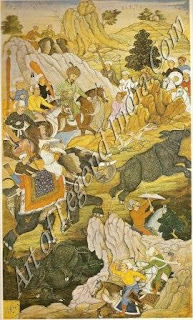 "On
closing the Memoirs, we have in our possession a Babur who is more real than
political record would make him. We have a Babur who, after many many trials of
a long life, retains the same kind and affectionate heart, and the same easy
and sociable temper with which he had set out on his career and in whom the
possession of power and grandeur had neither blunted the delicacy of his taste,
nor diminished the sensibility to the enjoyment of nature and
imagination."
"On
closing the Memoirs, we have in our possession a Babur who is more real than
political record would make him. We have a Babur who, after many many trials of
a long life, retains the same kind and affectionate heart, and the same easy
and sociable temper with which he had set out on his career and in whom the
possession of power and grandeur had neither blunted the delicacy of his taste,
nor diminished the sensibility to the enjoyment of nature and
imagination." 










0 Response to "The Babur Nama"
Post a Comment